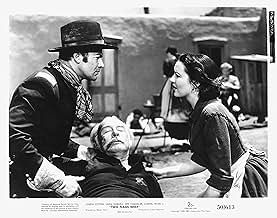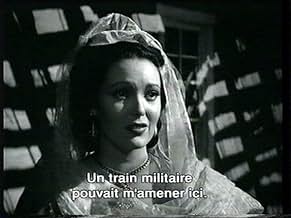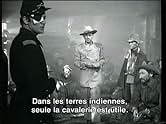PUNTUACIÓN EN IMDb
6,7/10
1,3 mil
TU PUNTUACIÓN
Obligados por las circunstancias, los prisioneros de guerra confederados y los soldados de la Unión unen sus fuerzas contra los indios, pero las viejas animosidades resurgen durante su frági... Leer todoObligados por las circunstancias, los prisioneros de guerra confederados y los soldados de la Unión unen sus fuerzas contra los indios, pero las viejas animosidades resurgen durante su frágil alianza.Obligados por las circunstancias, los prisioneros de guerra confederados y los soldados de la Unión unen sus fuerzas contra los indios, pero las viejas animosidades resurgen durante su frágil alianza.
- Dirección
- Guión
- Reparto principal
Noah Beery Jr.
- Cy Davis
- (as Noah Beery)
Johnny Sands
- Lt. Adams
- (as John Sands)
Robert Adler
- Hank
- (sin acreditar)
Stanley Andrews
- Col. Hoffman
- (sin acreditar)
Jose Baca
- Undetermined Secondary Role
- (sin acreditar)
Marjorie Bennett
- Mrs. Simpkins
- (sin acreditar)
Chet Brandenburg
- Confederate Soldier
- (sin acreditar)
Bertha Brennan
- Undetermined Secondary Role
- (sin acreditar)
Buck Bucko
- Confederate Soldier
- (sin acreditar)
Bill Burch
- Undetermined Secondary Role
- (sin acreditar)
Reseñas destacadas
Two Flags West begins with Confederate colonel Joseph Cotten given an offer to have his men get paroled from prison if they'll serve in the union army out west where the troops are stretched pretty thin. Over some objections he takes the offer from Captain Cornel Wilde.
Wilde takes Cotten and his men to Fort Thorn in the Southwest which is commanded by rebel hating and Indian hating Jeff Chandler. There's a good reason why this guy is in a backwater command as you'll see as the film unfolds. In addition there's Linda Darnell, wife of Chandler's late brother who was killed in the Civil War and who all three guys have their eyes on. But Chandler scares Darnell as well he should.
It was interesting to see Chandler whose career role was Cochise playing an Indian hater. But he does successfully put over the character. His Indian hating causes a lot of tragedy before the film is over.
Two Flags West is a brooding kind of western that's not for the squeamish. It's an exceptionally violent film that I'm not sure how it got through the Code. It's one of Jeff Chandler's best early roles, too bad Universal didn't cast him in more films like Two Flags West.
Wilde takes Cotten and his men to Fort Thorn in the Southwest which is commanded by rebel hating and Indian hating Jeff Chandler. There's a good reason why this guy is in a backwater command as you'll see as the film unfolds. In addition there's Linda Darnell, wife of Chandler's late brother who was killed in the Civil War and who all three guys have their eyes on. But Chandler scares Darnell as well he should.
It was interesting to see Chandler whose career role was Cochise playing an Indian hater. But he does successfully put over the character. His Indian hating causes a lot of tragedy before the film is over.
Two Flags West is a brooding kind of western that's not for the squeamish. It's an exceptionally violent film that I'm not sure how it got through the Code. It's one of Jeff Chandler's best early roles, too bad Universal didn't cast him in more films like Two Flags West.
Two Flags West is directed by Robert Wise and adapted to screenplay by Casey Robinson from a story by Frank S. Nugent and Curtis Kenyon. It stars Joseph Cotten, Linda Darnell, Jeff Chandler, Cornel Wilde, Dale Robertson, Jay C. Flippen, Noah Beery Jr., Harry von Zell, Johnny Sands and Arthur Hunnicutt. Music is by Hugo Friedhofer and cinematography by Leon Shamroy.
"On December 8th, 1863, President Abraham Lincoln issued a Special Proclamation, whereby Confederate Prisoners of War might gain their freedom, provided they would join the Union Army to defend the frontier West against the Indians."
A great premise drives this brooding yet action pumped Western forward, a production bolstered by crisp black and white location photography at San Ildefonso Pueblo, New Mexico, skilled direction by multi-genre director Wise and characterisations rich in thought and human interest value.
Film essentially centres around the workings of Fort Thorn, a Union Army stronghold commanded by embittered Maj. Henry Kenniston (Chandler). As he takes delivery of a unit of Confederate prisoners from Rock Island Prison Camp, themselves commanded by Col. Clay Tucker (Cotten), he struggles to contain his distaste. Something which obviously isn't helping an already pressure cooker atmosphere as groups of men divided by the on going war, are expected to stand or fall next to each other against the looming presence of chief Satank and his army of braves.
As the screenplay rolls on we learn about the main players beliefs and reasons for such, with the tragedy of the war deftly born out by the actors in their portrayals. The presence of widow Elena Kenniston (Darnell) also is cause for simmering tensions, where although an underwritten potential love triangle sometimes feels like a token offering on the edges of the frame, her character is so well drawn into the moody atmosphere, her back story packing emotional sting, that the film benefits from this case of testosterone lowering.
In amongst the Fort's uneasy alliance there are devious plans afoot on both sides of the coalition, that is to be expected, for it would be pretty standard stuff if these guys all agreed to shake hands and get on with it. But again the screenplay delivers some well thought out scenarios where agents and spies come into play, the safe transporting of civilians away from the Fort throws up some spice, as does a desperate act of violence by Major Kenniston. It all builds to a head and then Wise unleashes his skills as a overseer of action.
The crowning moment comes with the Indian attack on Fort Thorn. It's a prolonged attack filled with hundreds of extras and action aplenty. Each frame shot by Wise features flying bodies, arrows and bullets making their mark, fire raging in all parts of the ravaged Fort. Men, women and even children taking up the good fight as well, the Indian braves a fearsome and athletic foe coming in continuous waves. And this is not some Western where all the characters we have come to know are going to be singing come the end, some will die and it makes for dramatic and emotional impact.
Great cast, great direction and a great screenplay, this definitely deserves to be better known and loved by those into Westerns/Civil War movies. 8.5/10
"On December 8th, 1863, President Abraham Lincoln issued a Special Proclamation, whereby Confederate Prisoners of War might gain their freedom, provided they would join the Union Army to defend the frontier West against the Indians."
A great premise drives this brooding yet action pumped Western forward, a production bolstered by crisp black and white location photography at San Ildefonso Pueblo, New Mexico, skilled direction by multi-genre director Wise and characterisations rich in thought and human interest value.
Film essentially centres around the workings of Fort Thorn, a Union Army stronghold commanded by embittered Maj. Henry Kenniston (Chandler). As he takes delivery of a unit of Confederate prisoners from Rock Island Prison Camp, themselves commanded by Col. Clay Tucker (Cotten), he struggles to contain his distaste. Something which obviously isn't helping an already pressure cooker atmosphere as groups of men divided by the on going war, are expected to stand or fall next to each other against the looming presence of chief Satank and his army of braves.
As the screenplay rolls on we learn about the main players beliefs and reasons for such, with the tragedy of the war deftly born out by the actors in their portrayals. The presence of widow Elena Kenniston (Darnell) also is cause for simmering tensions, where although an underwritten potential love triangle sometimes feels like a token offering on the edges of the frame, her character is so well drawn into the moody atmosphere, her back story packing emotional sting, that the film benefits from this case of testosterone lowering.
In amongst the Fort's uneasy alliance there are devious plans afoot on both sides of the coalition, that is to be expected, for it would be pretty standard stuff if these guys all agreed to shake hands and get on with it. But again the screenplay delivers some well thought out scenarios where agents and spies come into play, the safe transporting of civilians away from the Fort throws up some spice, as does a desperate act of violence by Major Kenniston. It all builds to a head and then Wise unleashes his skills as a overseer of action.
The crowning moment comes with the Indian attack on Fort Thorn. It's a prolonged attack filled with hundreds of extras and action aplenty. Each frame shot by Wise features flying bodies, arrows and bullets making their mark, fire raging in all parts of the ravaged Fort. Men, women and even children taking up the good fight as well, the Indian braves a fearsome and athletic foe coming in continuous waves. And this is not some Western where all the characters we have come to know are going to be singing come the end, some will die and it makes for dramatic and emotional impact.
Great cast, great direction and a great screenplay, this definitely deserves to be better known and loved by those into Westerns/Civil War movies. 8.5/10
This is an action packed cavalry film set during the Civil War.
It begins with our protagonist, Joseph Cotton's character, a Confederate officer rotting in a Union prison with 43 of his men. They are offered a chance to fight Indians in the West, an act guaranteed not to hurt the Southern cause. When Cotton's character puts it to a vote to his men, it is deadlocked 21-21, with the tying vote a dying man who passes away before he can voice an opinion.
Cotton grabs the chance, and becomes a cavalry man, befriended by Cornel Wilde, a Union officer. Jeff Chandler plays the commander of the fort he is taken to. The star studded cast includes some great character actors, and their talents aren't wasted.
At the fort, Chandler quickly becomes the antagonist. His character resembles Henry Fonda's commander in FORT APACHE, obviously on purpose. In ways, this is almost a remake as far as characters go, but with a different story line.
A damsel in distress, the widow of Chandler's brother, killed in a battle in which Cotton took part, makes for high tension and high drama.
Later on, Chandler captures the head honcho Apache's son, and when the Apache chief demands his son's release, Chandler kills the son.
The other parts of the plot, I won't spoil. What we get are very identifiable three dimensional characters in great Western action. The fifties were the golden age for good reason. Great characters. This is a prime example. The two main antagonists both climax with acts of honor, one in supreme sacrifice, and one in relenting against a massacre for the sake of justice.
Compare these characters to the one dimensional clichés of Leone debacles, cardboard cutouts who do nothing but hate and kill, of the caricatures of "Tombstone" and other garbage, and there's no comparison. This film is so superior, it boggles the mind.
It took Hollywood four decades to realize their mistake, and now we at least see some Westerns that deal with credible characters, such as the ones you'll see Robert Duvall in. The difference is that this golden age dealt in splendor, scenery, and cinema, while the modern Western aims for total realism. While the modern Western has value, I still prefer the spectacle of cinematic glory and color to the modern dullness and dust. Both are good, but this type is more uplifting, and gives you the energy to get more done, so I give these films an edge.
Excellent acting, great scenery, directing, everything you could want, but my two chief criteria, writing and characters, are both of high quality here, too. This film is an example of "great characters make great films".
It begins with our protagonist, Joseph Cotton's character, a Confederate officer rotting in a Union prison with 43 of his men. They are offered a chance to fight Indians in the West, an act guaranteed not to hurt the Southern cause. When Cotton's character puts it to a vote to his men, it is deadlocked 21-21, with the tying vote a dying man who passes away before he can voice an opinion.
Cotton grabs the chance, and becomes a cavalry man, befriended by Cornel Wilde, a Union officer. Jeff Chandler plays the commander of the fort he is taken to. The star studded cast includes some great character actors, and their talents aren't wasted.
At the fort, Chandler quickly becomes the antagonist. His character resembles Henry Fonda's commander in FORT APACHE, obviously on purpose. In ways, this is almost a remake as far as characters go, but with a different story line.
A damsel in distress, the widow of Chandler's brother, killed in a battle in which Cotton took part, makes for high tension and high drama.
Later on, Chandler captures the head honcho Apache's son, and when the Apache chief demands his son's release, Chandler kills the son.
The other parts of the plot, I won't spoil. What we get are very identifiable three dimensional characters in great Western action. The fifties were the golden age for good reason. Great characters. This is a prime example. The two main antagonists both climax with acts of honor, one in supreme sacrifice, and one in relenting against a massacre for the sake of justice.
Compare these characters to the one dimensional clichés of Leone debacles, cardboard cutouts who do nothing but hate and kill, of the caricatures of "Tombstone" and other garbage, and there's no comparison. This film is so superior, it boggles the mind.
It took Hollywood four decades to realize their mistake, and now we at least see some Westerns that deal with credible characters, such as the ones you'll see Robert Duvall in. The difference is that this golden age dealt in splendor, scenery, and cinema, while the modern Western aims for total realism. While the modern Western has value, I still prefer the spectacle of cinematic glory and color to the modern dullness and dust. Both are good, but this type is more uplifting, and gives you the energy to get more done, so I give these films an edge.
Excellent acting, great scenery, directing, everything you could want, but my two chief criteria, writing and characters, are both of high quality here, too. This film is an example of "great characters make great films".
This gritty western is a post-Civil War affair set in New Mexico where soldiers of the Blue and the Gray are obliged to let bygones be bygones and tame the wild frontier for westward expansion. The usual antagonisms are present in abundance, with Union officers reluctant to trust the Confederate troops and question their allegiance to the United States. A top cast is headed by Joseph Cotten and Jeff Chandler, who constantly spar with each other about men, munitions and how to meet the Indian threat. Linda Darnell is the lone femme in the cast and her presence sparks romantic interest and jealousy in equal measure at the army post. The Yank-Rebel forces manage to put their bickering aside to defend against an Indian attack that remains one of the best ever filmed. The black and white lensing is good and enhances director Robert Wise's fine film.
Was Robert Wise making his version of a John Ford cavalry picture ? Ford had released 2/3 of his magnificent trilogy by then.
The emotionally resounding mythic backgrounds, complex characters, heart and quality ring true as if it almost belongs in that trilogy (Fort Apache, She Wore a Yellow Ribbon, Rio Grande).
Recommended.
The emotionally resounding mythic backgrounds, complex characters, heart and quality ring true as if it almost belongs in that trilogy (Fort Apache, She Wore a Yellow Ribbon, Rio Grande).
Recommended.
¿Sabías que...?
- CuriosidadesJeff Chandler, who was in the very early stages of his career, admired Joseph Cotten so much that he would show up to watch the veteran actor work even when he was not scheduled to be there.
- PifiasThe film is set in 1864 but the pistol a trooper uses to nail up a picture appears to be a Remington model 1875 Single Action Army Revolver using metallic cartridges which wasn't introduced until 1875. He should have carried either a Colt 1860 Cap & Ball revolver or a Remington 1858 Cap & Ball revolver.
- ConexionesFeatured in The Making of 'The Day the Earth Stood Still' (2008)
Selecciones populares
Inicia sesión para calificar y añadir a tu lista para recibir recomendaciones personalizadas
- How long is Two Flags West?Con tecnología de Alexa
Detalles
- Duración1 hora 32 minutos
- Color
- Relación de aspecto
- 1.37 : 1
Contribuir a esta página
Sugerir un cambio o añadir el contenido que falta

Principal laguna de datos
What is the French language plot outline for Entre dos juramentos (1950)?
Responde






















